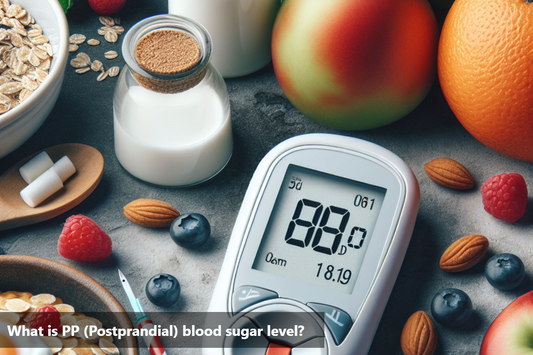Maintaining normal blood sugar levels is crucial for overall health. It provides energy for cells and tissues to function optimally, preventing health issues like diabetes and heart diseases. A balanced diet and exercise help keep blood sugar stable. Understanding this helps make informed lifestyle choices for better health. Learn more about normal blood sugar levels, influencing factors, and effective maintenance strategies to prioritize well-being.
What is Normal Blood Sugar Level?
Normal blood sugar levels range from 70 to 99 mg/dL when fasting and below 125 mg/dL randomly. These levels indicate how well the body processes glucose. Regular monitoring is key to managing energy, mood, and overall health.
Children Under 18 |
Fasting Glucose (mg/dL) |
Random Glucose (mg/dL) |
HbA1c (%) |
|---|---|---|---|
Normal |
70-100 |
<140 |
<5.7 |
Prediabetes |
100-125 |
140-199 |
5.7-6.4 |
Type 1 Diabetes |
≥126 |
≥200 |
≥6.5 |
Type 2 Diabetes |
≥126 |
≥200 |
≥6.5 |
Adults 18-59 |
Fasting Glucose (mg/dL) |
OGTT 2-hr Glucose (mg/dL) |
HbA1c (%) |
|---|---|---|---|
Normal |
70-100 |
<140 |
<5.7 |
Prediabetes |
100-125 |
140-199 |
5.7-6.4 |
Type 1 Diabetes |
≥126 |
≥200 |
≥6.5 |
Type 2 Diabetes |
≥126 |
≥200 |
≥6.5 |
Seniors 60 and above |
Fasting Glucose (mg/dL) |
Random Glucose (mg/dL) |
HbA1c (%) |
|---|---|---|---|
Normal |
70-100 |
<140 |
<5.7 |
Prediabetes |
100-125 |
140-199 |
5.7-6.4 |
Type 1 Diabetes |
≥126 |
≥200 |
≥6.5 |
Type 2 Diabetes |
≥126 |
≥200 |
≥6.5 |
Factors Affecting Blood Sugar Levels
Diet
Consuming a balanced diet rich in whole grains, vegetables, fruits, lean proteins, and healthy fats can help stabilize blood sugar levels. Avoiding excessive consumption of sugary foods and refined carbohydrates is essential in preventing spikes in blood sugar.
Exercise
Regular physical activity such as brisk walking, cycling, or strength training can help the body utilize glucose for energy, thereby reducing blood sugar levels.
Medication
Proper adherence to prescribed medications, insulin injections, or oral hypoglycemic agents is crucial for individuals with diabetes to maintain normal blood sugar levels.
Underlying Health Conditions
Health issues such as thyroid disorders, hormonal imbalances, or kidney problems can also impact blood sugar regulation. Addressing these conditions promptly is important in preventing fluctuations in blood sugar levels.
Maintaining Normal Blood Sugar Levels
Managing blood sugar levels within the normal range is essential for overall health and well-being. Here are some effective tips and strategies to help you achieve this goal:
Balanced Diet: Consuming a healthy and balanced diet plays a crucial role in regulating blood sugar levels. Focus on incorporating whole grains, lean proteins, fruits, and vegetables into your meals.
Regular Exercise: Engaging in physical activity on a regular basis can help improve insulin sensitivity and control blood sugar levels. Aim for at least 30 minutes of moderate exercise each day.
Monitor Carbohydrate Intake: Be mindful of your carbohydrate consumption as it directly impacts blood sugar levels. Opt for complex carbohydrates and limit the intake of sugary foods and drinks.
Stay Hydrated: Drinking an adequate amount of water throughout the day can aid in maintaining normal blood sugar levels.
Get Enough Sleep: Lack of sleep can disrupt hormone levels and lead to fluctuations in blood sugar. Aim for 7-8 hours of quality sleep each night.
Regular monitoring of blood sugar levels is crucial in detecting any deviations from the normal range. Utilize glucose meters and follow the advice of healthcare professionals to keep track of your levels consistently. By implementing these tips and maintaining a healthy lifestyle, you can effectively manage and maintain normal blood sugar levels for optimal health.
To conclude:
Normal blood sugar levels are essential for our overall health and well-being. Maintaining a steady sugar level in the body is crucial for optimal function. The normal range for blood sugar levels ensures that our bodies receive the necessary energy without any spikes or crashes.
Monitoring blood sugar levels regularly is key to understanding and managing your health effectively. By keeping your sugar levels within the normal range, you reduce the risk of developing complications associated with high or low blood sugar levels.
Having a balanced diet, engaging in regular physical activity, and following a consistent medication routine are vital factors in maintaining normal blood sugar levels. These practices contribute to a healthy lifestyle and help in stabilizing your sugar levels.
By being mindful of your blood sugar levels, you can prevent potential health issues in the future. Remember, achieving and sustaining normal blood sugar levels is a proactive approach towards a healthier life.
In conclusion, prioritizing the regulation of normal blood sugar levels is fundamental for your overall well-being. Stay informed, stay committed, and stay healthy.
FAQs:
What is considered a normal blood sugar level?
The normal range of blood sugar level is typically between 80-120 mg/dL when fasting and below 180 mg/dL two hours after eating.
How can I maintain a normal blood sugar level?
Maintaining a healthy lifestyle with a balanced diet, regular exercise, and monitoring sugar intake can help in sustaining normal blood sugar levels.
What are the consequences of high blood sugar levels?
High blood sugar levels can lead to serious health complications, such as diabetic ketoacidosis, damage to blood vessels and organs, and an increased risk of heart disease.
What factors can influence blood sugar levels?
Factors like diet, physical activity, stress levels, medications, and underlying health conditions can all affect blood sugar levels.
When should I be concerned about my blood sugar level?
It is advisable to consult a healthcare professional if your blood sugar levels consistently fall outside the normal range or if you experience symptoms like excessive thirst, frequent urination, or unexplained weight loss.
This Blog post is an initiative by DiabeSmart, to provide accurate and Nutritionist / Doctor approved information related to Diabetes. DiabeSmart is India's first Food brand designed specifically for Diabetics, that has been clinically tested on Diabetics and Pre-Diabetics to deliver 55% - 70% lower Sugar spikes. DiabeSmart is part of Lo! Foods - India's leading brand for Everyday Functional Health foods.











